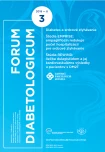What is actually the cardiovascular risk related to type 2 diabetes?
Authors:
Ivan Tkáč
Authors‘ workplace:
IV. interná klinika UPJŠ LF a UNLP Košice
Published in:
Forum Diab 2019; 8(3): 170-173
Category:
Review Article
Overview
Cardiovascular risk assessment by SCORE tables is used in subjects without diabetes. Even the latest recommendations of the European Cardiology Society (ESC) assess the cardiovascular (CV) risk in patients with based on the expert consensus and not on the basis of the risk calculated from the tables. The paper demonstrates the risk of developing major CV events and CV mortality observed in studies with SGLT2 inhibitors and GLP1 receptor agonists. In all studies where an effect on the primary composite outcome was observed, the 10-year risk of CV mortality was greater than 10 % and the risk of developing major CV events was greater than 25 %, which corresponds to a very high SCORE risk. The closest to the characteristics of the so-called general population of patients with diabetes in clinical practice was that of the REWIND study that compared add-on therapy with a GLP1 receptor agonist dulaglutide with placebo.
Keywords:
cardiovascular risk – clinical studies – GLP1 receptor agonists – SGLT2 inhibitors – type 2 diabetes
Sources
- Haffner SM, Lehto S, Rönnemaa T et al. Mortality from coronary heart disease in subjects with type 2 diabetes and in nondiabetic subjects with and without prior myocardial infarction. N Engl J Med 1998; 339(4): 229–234. Dostupné z DOI: <http://dx.doi.org/10.1056/NEJM199807233390404>.
- Piepoli MF, Hoes AW, Agewal S et al. 2016 European Guidelines on cardiovascular disease prevention in clinical practice: The Sixth Joint Task Force of the European Society of Cardiology and Other Societies on Cardiovascular Disease Prevention in Clinical Practice (constituted by representatives of 10 societies and by invited experts)Developed with the special contribution of the European Association for Cardiovascular Prevention & Rehabilitation (EACPR). Eur Heart J 2016; 37(29): 2315–2381. Dostupné z DOI: <http://dx.doi.org/10.1093/eurheartj/ehw106>.
- Cosentino F, Grant PJ, Aboyans V et al. 2019 ESC Guidelines on diabetes, pre-diabetes, and cardiovascular diseases developed in collaboration with the EASD. Eur Heart J 2019. pii: ehz486. Dostupné z DOI: <http://dx.doi.org/10.1093/eurheartj/ehz486>.
- Wiviott SD, Raz I, Bonaca MP et al. Dapagliflozin and cardiovascular outcomes in type 2 diabetes. N Engl J Med 2019; 380(4): 347–357. Dostupné z DOI: <http://dx.doi.org/10.1056/NEJMoa1812389>.
- Neal B, Perkovic V, Mahaffey KW et al. Canagliflozin and cardiovascular and renal events in type 2 diabetes. N Engl J Med 2017; 377(7): 644–657. Dostupné z DOI: <http://dx.doi.org/10.1056/NEJMoa1611925>.
- Zinman B, Wanner C, Lachin JM et al. Empagliflozin, cardiovascular outcomes, and mortality in type 2 diabetes. N Engl J Med 2015; 373 : 2117–2128. Dostupné z DOI: <http://dx.doi.org/10.1056/NEJMoa1504720>.
- Gerstein HC, Calhoun HM, Dagenais GR, et al. Dulaglutide and cardiovascular outcomes in type 2 diabetes (REWIND): a double-blind, randomised placebo-controlled trial. Lancet 2019; 394(10193): 121–130. Dostupné z DOI: <http://dx.doi.org/ 10.1016/S0140–6736(19)31149–3>.
- Pfeffer MA, Claggett B, Diaz R et al. Lixisenatide in patients with type 2 diabetes and acute coronary syndrome. N Engl J Med 2015; 373(23): 2247–2257. Dostupné z DOI: <http://dx.doi.org/10.1056/NEJMoa1509225>.
- Hernandez AF, Green JB, Janmohamed S et al. Albiglutide and cardiovascular outcomes in patients with type 2 diabetes and cardiovascular diesease (Harmony Outcomes): a double-blind, randomised placebo-controlled trial. Lancet 2018; 392(10157): 1519–1529. Dostupné z DOI: <http://dx.doi.org/10.1016/S0140–6736(18)32261-X>.
- Marso SP, Daniels GH, Brown-Frandsen K et al. Liraglutide and cardiovascular outcomes in type 2 diabetes. N Engl J Med 2016; 375(4): 311–322. Dostupné z DOI: <http://dx.doi.org/10.1056/NEJMoa1603827>.
- Marso SP, Bain SC, Consoli A et al. Semaglutide and cardiovascular outcomes in patients with type 2 diabetes. N Engl J Med 2016; 375(19): 1834–1844. Dostupné z DOI: <http://dx.doi.org/10.1056/NEJMoa1607141>.
- Holman RR, Bethel MB, Mentz RJ et al. Effects of once-weekly exenatide on cardiovascular outcomes in type 2 diabetes. N Engl J Med 2017; 377(13): 1228–1239. Dostupné z DOI: <http://dx.doi.org/10.1056/NEJMoa1612917>.
- Birkeland KI, Jørgensen ME, Carstensen B et al. Cardiovascular mortality and morbidity in patients with type 2 diabetes following initiation of sodium-glucose co-transporter-2 inhibitors versus other glucose-lowering drugs (CVD-REAL Nordic): a multinational observational analysis. Lancet Diabetes Endocrinol 2017; 5(9): 709–717. Dostupné z DOI: <http://dx.doi.org/10.1016/S2213–8587(17)30258–9>.
- Drucker DJ. The ascending GLP-1 road from clinical safety to reduction of cardiovascular complications. Diabetes 2018; 67(9): 1710–1719. Dostupné z DOI: <http://dx.doi.org/10.2337/dbi18–0008>.
Labels
Diabetology Endocrinology Internal medicineArticle was published in
Forum Diabetologicum

2019 Issue 3
-
All articles in this issue
- Diabetic cardiomyopathy and heart failure
- What is actually the cardiovascular risk related to type 2 diabetes?
- Cardiorenal syndrome and gliflozins
- Obesity, diabetes mellitus and cardiovascular disease: dangerous metabolic triad
- The role of a fixed-ratio titratable combination of iGlarLixi in type 2 diabetes mellitus therapeutic regimen
- The EMPRISE study (Real World Evidence): empagliflozin is reducing number of hospitalizations for heart failure, even in patients without cardiovascular disease
- Cardiovascular studies and gliflozins
- Dulaglutide and cardiovascular outcomes in patients with type 2 diabetes: REWIND study
- Continuous monitoring of blood glucose in diabetes mellitus management – aid in individualization of treatment
- Forum Diabetologicum
- Journal archive
- Current issue
- About the journal
Most read in this issue
- Continuous monitoring of blood glucose in diabetes mellitus management – aid in individualization of treatment
- What is actually the cardiovascular risk related to type 2 diabetes?
- Obesity, diabetes mellitus and cardiovascular disease: dangerous metabolic triad
- Dulaglutide and cardiovascular outcomes in patients with type 2 diabetes: REWIND study
